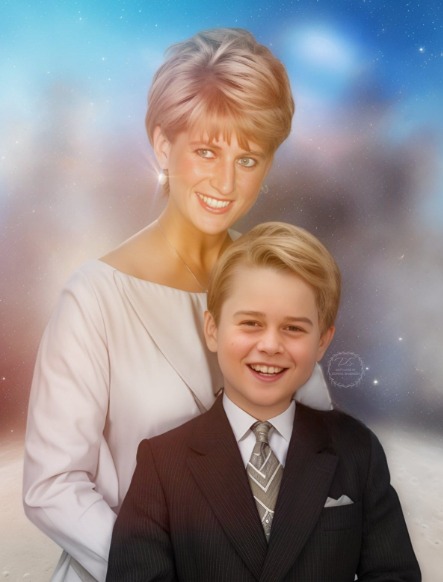In an unexpected twist that has captured the attention of the public and royal watchers alike, Prince George, the eldest son of Prince William and Kate Middleton, has reportedly inherited a condition that once affected his grandmother, the late Princess Diana. This news has sent ripples through the royal family, but it comes with a silver lining that brings a sense of optimism for the future.

Sources close to the royal family have revealed that Prince George has been diagnosed with a mild form of dyslexia, a learning difference that Diana herself had experienced during her formative years. While this revelation initially shocked the royal family, who have always prided themselves on their academic achievements, it also provided a poignant connection to Diana, whose struggles with dyslexia shaped her compassionate approach to education and child development.
Dyslexia, which affects reading, writing, and spelling skills, is not uncommon and can be managed with proper support and intervention. The royal family has been quick to emphasize that the diagnosis should not be viewed as a setback but rather as an opportunity for growth and resilience. Prince William and Kate, who are dedicated to ensuring their children receive a well-rounded education, are committed to providing George with the necessary resources to thrive academically.
In a statement released by the Palace, the couple expressed their support for their son. “We are incredibly proud of George and the progress he is making. His diagnosis does not define him; it simply means he will navigate his learning journey in a unique way, much like his grandmother did,” they shared. This open and supportive approach aligns with the couple’s philosophy of fostering a nurturing environment for their children, emphasizing emotional well-being alongside academic success.
The news has also sparked a conversation about the importance of awareness regarding learning differences. Dyslexia affects millions of children worldwide, and raising awareness can help eliminate stigma and encourage early intervention. Many advocates have praised the royal family’s decision to be transparent about Prince George’s condition, seeing it as a step toward normalizing discussions about learning differences within the public sphere.
Public reactions to the announcement have been overwhelmingly positive. Many fans of the royal family have taken to social media to express their support for Prince George, sharing their own experiences with dyslexia and offering words of encouragement. The hashtag #TeamGeorge quickly gained traction, as supporters rallied around the young prince, emphasizing that with the right tools and support, he can achieve great things.
Additionally, this revelation has brought renewed focus to Princess Diana’s legacy. Diana was known for her commitment to education and advocacy for children with learning difficulties. Her own experiences with dyslexia fueled her passion for ensuring that all children, regardless of their challenges, have access to quality education and support. Many see Prince George’s diagnosis as a continuation of Diana’s legacy, reminding the public of her compassion and dedication to helping others.
As the royal family navigates this new chapter, they remain optimistic about Prince George’s future. With the support of his parents, educators, and specialists, he is well-equipped to face any challenges that may arise. The family’s proactive stance not only reflects their commitment to George’s well-being but also sets a powerful example for other families dealing with similar situations.
In conclusion, while the news of Prince George’s dyslexia initially shocked the royal family, it has ultimately become a source of inspiration. The understanding and compassion that stem from this revelation serve to honor Princess Diana’s legacy, reminding everyone that challenges can lead to resilience and growth. As Prince George continues to forge his own path, the royal family stands united, ready to support him every step of the way.